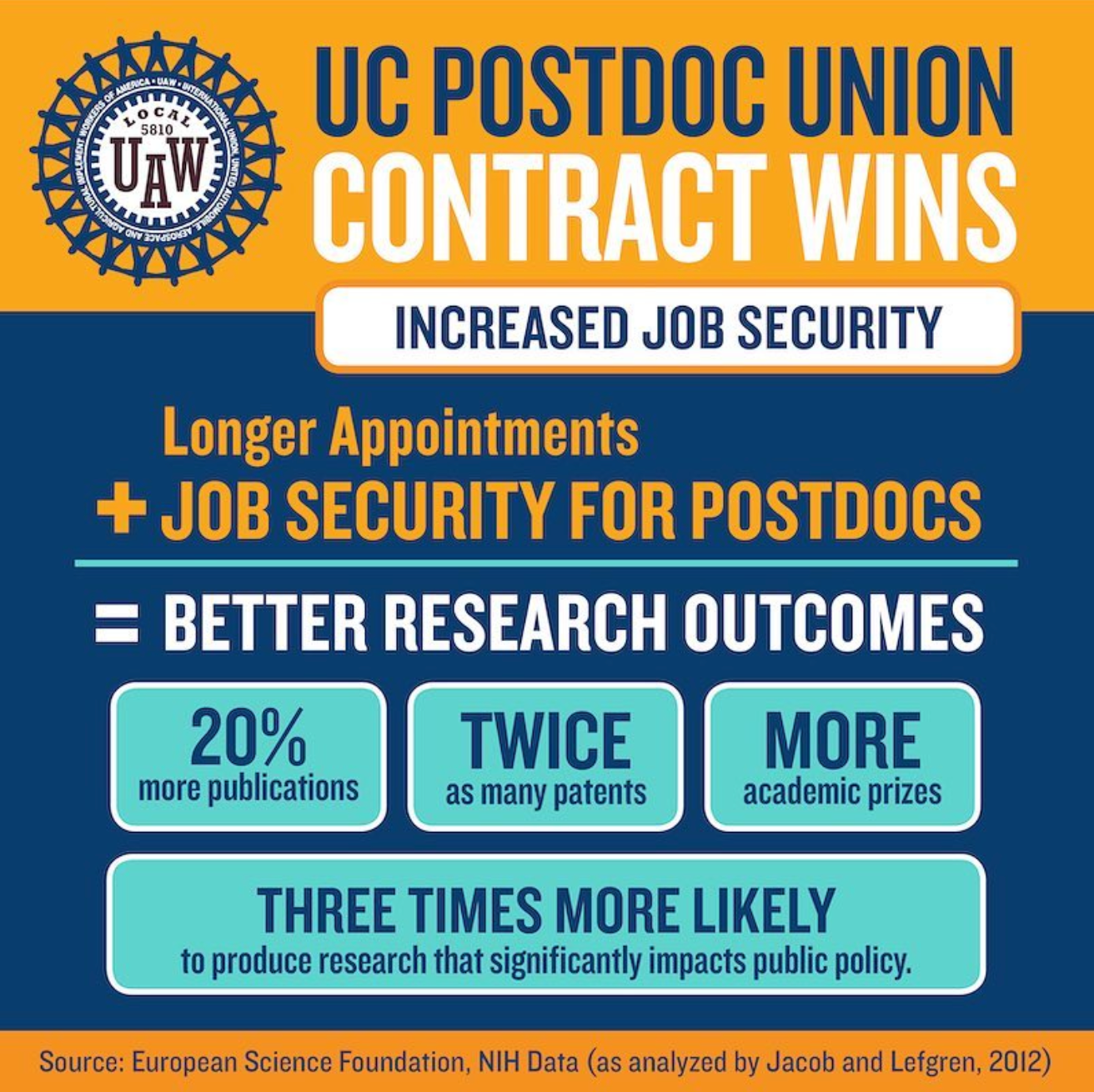Issues and Improvements: What’s Happened at Other Universities Where Postdocs Formed Unions?
While we continue to organize to form our union, we are also assembling knowledge and feedback from the postdoc and grad population. Below are some issues that come up repeatedly in conversations and on surveys, along with how unions at other universities have been able to win improvements.
Healthcare
Health, dental, and vision insurance isn’t a luxury—it’s essential. In the past, Caltech has made changes to our healthcare plan with little to no input from postdoc employees. Collective advocacy has historically been successful in pushing back on increases to premiums and out-of-pocket costs, but without a union, Caltech has no legal obligation to take worker needs into account.
Currently, healthcare costs $173/mo for an individual on the Anthem HMO plan. Postdocs can pay as low as $54/month in premium costs if they are willing to accept a $3,000 annual deductible—and only if they are not on a J-1 visa. Postdocs’ health insurance options have been criticized as an “illusion of choice”. Dependent healthcare is very expensive (up to $641/month, with dental and vision costing extra), and Caltech does not offer any paid long-term medical leave.
Most insurance plans offered by Caltech are administered by Anthem, which has drawn criticism by physician groups for improperly denying claims. The only other option is the Kaiser HMO, but Kaiser has likewise been in the crossfire for denying claims, in particular related to mental healthcare.
UC Postdocs have won and preserved, through union contract negotiations, a choice of HMO and PPO plans, with postdocs responsible for between $12.71 /mo (individual) and $60/mo (family), including vision and dental. Both plans meet the healthcare requirements for visa holders. They also established a Joint Healthcare Committee, that meets at least quarterly to discuss how the plans can be improved. At UW, Postdocs, in general, are part of the State of Washington public employee healthcare system with monthly premiums starting at $25 and no premium for dental insurance. In their most recent union contract, they won a $500/mo subsidy for Postdocs that do not qualify. UW Postdocs who select high deductible health plans receive annual contributions of $700 (individual) or $1,400 (family) to Health Savings Accounts (HSAs). Unions can also lend support in navigating the US healthcare system to ensure all Postdocs get the healthcare we need.
Wages
Unions create upward pressure on wages across industries in the US, and higher education is no different. Unions provide Postdocs with the right to collectively bargain for minimum wage standards and consistent pay increases. When researchers are able to afford a reasonable standard of living that is commensurate with their contributions, regardless of race or gender, the entire scientific community benefits. At Caltech, guaranteed wage increases can help us keep up with the rising costs of housing and childcare.
- Columbia Postdoctoral scholars became the highest paid postdocs in New York City when they won their first union contract, which included minimum pay increases of 14.5 – 20%. In their most recent contract, they continued to build on these gains and won a minimum salary of $70,000 with additional experiential increases.
- Prior to winning their first union contract in 2010, UC Postdocs had no minimum salary level and could be paid as little as $18,000 / yr. Their first contract established minimum salary levels and experiential increases, and they are now among the highest-paid Postdocs in the US.
- University of Washington Postdocs had a recommended pay scale tied to NIH NRSA fellowship pay. They won significant pay increases and enforceable minimum standards after unionizing, and in their most recent contract won a 37% pay increase by 2024.
Childcare and Parental leave
Many postdocs are at a stage in their career and their life when they would like to have children. Yet, 66% of postdoc parents at Caltech do not feel that they have adequate financial resources to provide their children with decent childcare. Childcare in Pasadena costs around $2,000 / mo, and dependent healthcare is an additional approx. $600 / mo (for spouse and child, non-high deductible plan).
- Columbia Postdoctoral Scholars won a lump sum $5,000 childcare payment into an FSA account in their most recent contract. They also preserved low-employee-cost dependent healthcare coverage ($49 / mo in 2023).
- UC Postdocs had no paid family leave or childcare benefits prior to unionizing. As of their most recent contract, they now have 8 weeks of paid family leave plus additional leave for maternity. They also created a new childcare subsidy and have maintained low-employee-cost dependent healthcare.
- UW Postdocs codified their right to receive 12 weeks paid family/medical leave per Washington State law in their union contract. They also established a $75,000 childcare assistance fund.
Abuse, Harassment, and Discrimination
A recent CGPU workplace conditions survey found that 46% of respondents have experienced some form of harassment, discrimination, or abusive conduct and that less than 10% believe Caltech effectively handles cases of abuse and harassment. Nature has documented how this is a worldwide problem in higher education, and Buzzfeed drew international attention to a 2016 sexual harassment case at Caltech.
Without a union, cases of discriminatory harassment are resolved through the Title IX office. However, the office is subject to legal regulations defined by the federal government that limit its ability to respond effectively, in many cases leaving victims unprotected. Title IX regulations are subject to change and currently offer weaker protections than ever before. In 2020, the Trump Administration largely defanged Title IX, and those new regulations still stand. Time Magazine describes the rule as an “interpretation of Title IX [that] not only places new barriers in the way of survivors coming forward, [and], for most victims, eliminates the possibility altogether.” The Biden Administration has been criticized for failing to restore stronger protections, instead announcing continual delays in releasing new regulations.
Unions enable protections against abuse, harassment, and discrimination that go above and beyond Title IX regulations. At UW, the postdocs’ contract states that “no employee shall be subjected to discrimination and harassment,” defined as actions that “could reasonably be expected to create an intimidating, hostile or offensive work or learning environment.” It also “prohibits retaliation against any individual who reports concerns regarding discrimination or harassment, who cooperates with or participates in any investigation of allegations of discrimination or harassment, or…any individual who is perceived to have engaged in any of these actions.” Violation of these rules results in a well-defined and survivor-led grievance process outlined in the contract. Contracts at UC and Columbia provide similar strong, survivor-centered protections.
With a union, we can craft and bargain for protections against harassment and discrimination that meet our needs. These protections will exist in addition to the current Title IX processes. This means that those who experience harassment would have the opportunity to report through the union’s grievance process, the Title IX process, or both. The result will be improved deterrents to abusive and discriminatory behavior and better methods of intervening in that behavior if it does occur.
“Many people know that academia can be a breeding ground for abuse and harassment. I’ve seen too many cases where workers were insulted by their supervisors, forced to put in long hours at the lab without overtime, pressured to leave their jobs, or even endured threats to their physical safety. Without the grievance process, I don’t think we would have heard about any of these cases. There was no recourse, no system–these individuals would have been forced to stay silent. Now, the grievance process empowers workers to fight back, signalling to the university that we will no longer tolerate abuse and harassment in our workplace.”
Job Security
Stress from job insecurity and feeling a constant need to apply for new positions can negatively impact the work we do as researchers. A union contract can ensure that we are not unjustly terminated and require that we receive timely feedback on our work.
- Columbia, UC, and UW Postdocs all won protections from unjust termination, unfair layoff, and minimum appointment lengths to provide greater peace of mind for Postdoctoral Researchers.

International Scholars
Science is an international endeavor, and we all benefit from a strong international community. Academic unions boost the voice of international researchers, and have fought for more fair and reasonable visa and immigration policies like expanding and extending OPT and preventing the “fixed duration of status” rule from going into effect (see also International Researchers page). Additionally, in other Postdoc union contracts:
- UC Postdocs created greater accountability for UC to process visa paperwork on time. Their union contract guarantees compensation for any losses suffered due to UC delays in work authorization processing and provides leave for immigration-related appointments.
- UW Postdocs won waivers of the J-1 SEVIS Fee and OPT Filing Fees.
Columbia Postdocs have won up to $1,250 to cover visa renewals, including travel costs. Columbia also agreed to hold positions open for at least 60 days if there are work authorization delays.

UW Grads and Postdocs joined a protest against Trump-era immigration policies
Disability justice, accessibility, and accommodation
Caltech is legally required to comply with the Americans with Disabilities Act. In practice, however, 18% of Caltech climate survey respondents with disabilities experienced barriers with accommodations from faculty, and researchers have little recourse if supervisors do not comply with the law. Unions can help educate Postdocs with disabilities about their rights, enforce and improve existing policies, and assist researchers in obtaining reasonable accommodations.
- UC Postdocs codified their right to reasonable accommodation in their union contract, and won the right to interim accommodations without first needing to provide medical documentation.
- UW and Columbia’s Postdoc union contract codify and make more enforceable Postdoc’s right to reasonable accommodation under US law
